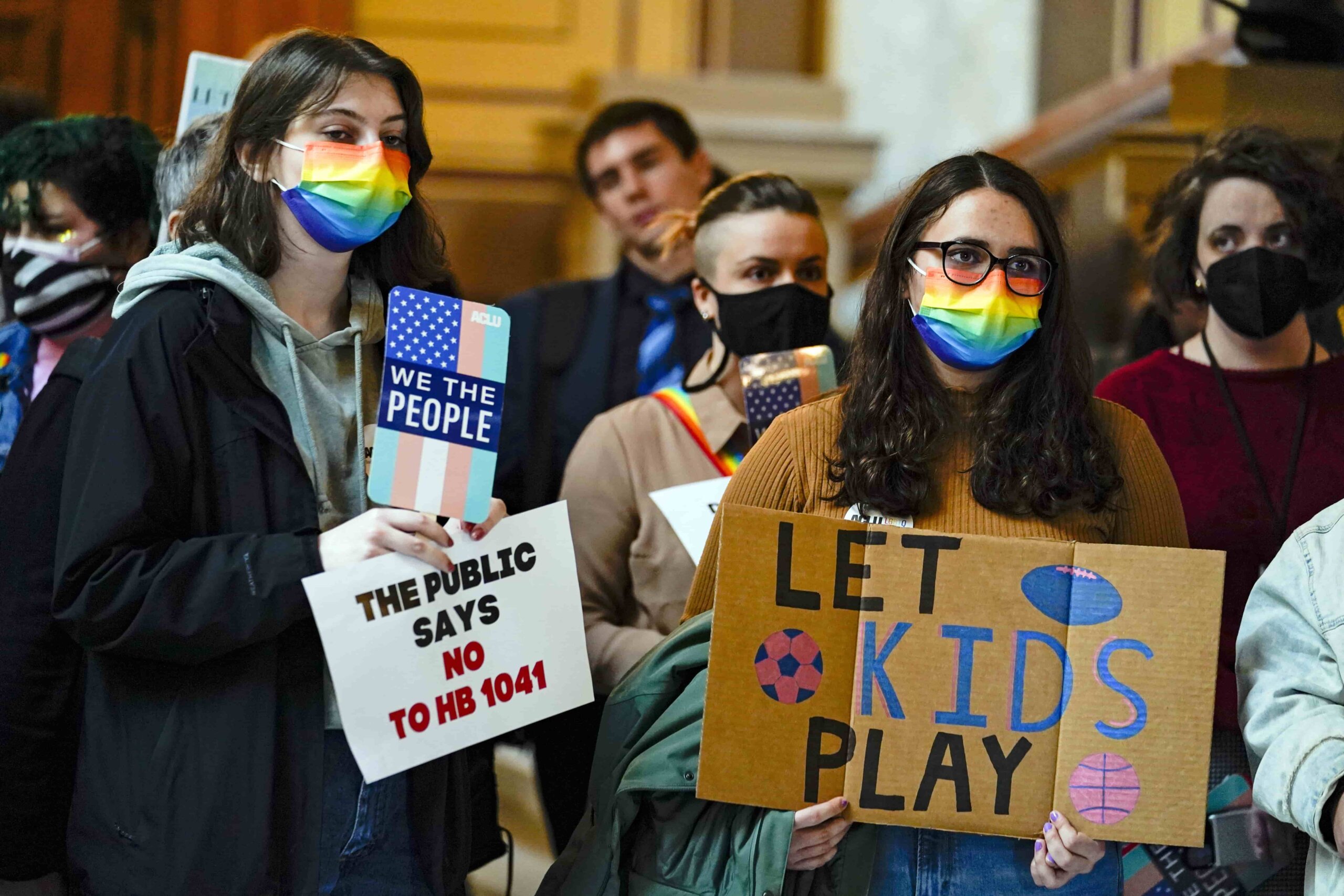Amid an unprecedented surge in transphobic legislation across the U.S., two states are moving to restrict trans youth participation in sports.
Indiana is poised to enact a trans sports ban after its general assembly passed a bill on March 1 that would bar trans girls from joining sports teams in line with their lived gender. The legislation pertains solely to K-12 athletics, meaning that college athletes will not be affected, and it does not impact trans male students participating in men’s sports.
House Bill 1041 would also allow students and their parents to file civil lawsuits in school districts that continue to allow trans girls to play women’s sports.
The legislation passed by wide margins in Indiana’s state legislature: 66-30 in the House and 32-18 in the Senate. HB 1041 now heads to Republican Gov. Eric Holcomb for consideration, who signaled strong support for the bill during a press conference last week.
“I agree adamantly that boys should be playing boys sports and girls should be playing girls sports,” he said in comments reported by the Indianapolis Star.
Holcomb added that he will make a decision when he sees the final “language” of the bill. An earlier draft applied to both K-12 and college sports before the latter were struck from the bill, likely over fear of blowback from the National Collegiate Athletic Association (NCAA). (The NCAA has recently faced criticism for rolling back guidelines for trans inclusion in sport in January.)
“Indiana legislators have exposed trans kids to additional exclusion and mistreatment.”
LGBTQ2S+ advocates in Indiana criticized HB 1041 following Tuesday’s final vote in the Senate. H.R. Jung, executive director of The LGBTQ Center, the state’s largest queer resource centre, tells Xtra in an email that the bill is “discriminatory and unconstitutional,” while Indiana Youth Group CEO Chris Paulsen predicts in a statement that, if enacted, the legislation would make “LGBTQ+ young people and their families feel unwelcome in our state.”
The Indiana chapter of the American Civil Liberties Union, which is suing to overturn similar legislation in states like West Virginia and Idaho, adds that the bill “singles out trans girls” while “jeopardizing their mental health, physical well-being and ability to access educational opportunities comparable to their peers.”
“By passing this bill, Indiana legislators have exposed trans kids to additional exclusion and mistreatment,” says Katie Blair, advocacy and public policy director with the ACLU of Indiana, in an email. “Trans kids have a right to live full lives, just like everyone else.”
Blair did not state whether the ACLU of Indiana plans to file a lawsuit against HB 1041 should Holcomb sign it into law.
The Indiana High School Athletics Association (IHSAA) already has guidance in place regarding trans athlete participation. For trans youth to compete on a high school team that matches their lived identity, IHSAA requires that they have “completed a minimum of one year of hormone treatment related to gender transition or undergone a medically confirmed gender reassignment procedure.”
Only one trans female student has asked to compete in girls’ sports under the policy, according to IHSAA.
The bill’s author, Rep. Michelle Davis, told the Indianapolis ABC affiliate WRTV that she wanted to “make sure all the opportunities are provided” for cisgender female athletes and that “we protect the fair competition for them.” But of the estimated 60,000 Indiana students currently competing in school sports, Davis admitted that she is only aware of one instance in which a cisgender girl was impacted by a trans participation policy.
Indiana isn’t the only state targeting trans athletes. An Iowa bill strikingly similar to Indiana’s legislation was signed into law by Gov. Kim Reynolds on March 3 after passing its state Senate 31-17 earlier this week. House File 2416 passed in February by a 55-39 margin.
Reynolds claimed in comments shared with the Des Moines Register earlier this week that the bill addresses a “fairness issue.” She has voiced concerns that cisgender girls are losing sports scholarships to trans athletes.
Supporters of the effort have claimed that the legislation is “not about hatred or discrimination.”
“It is about keeping ourselves in alignment with reality,” said Sen. Jeff Taylor in comments cited by local news broadcaster Radio Iowa. “It simply says, in regard to a non-coed, team context, that girls should be competing against other girls in K-12 athletics and women should be competing against other women in college athletics.”
The Republican state lawmaker seemingly contradicted claims HF 2416 is not based in bigotry by additionally alleging that “transgender ideology” is a danger to women.
Ten U.S. states currently have laws on the books that block trans athletes from playing school sports in accordance with their gender. In February, South Dakota became the latest state to pass a trans sports ban after Alabama, Mississippi, Montana and Tennessee all enacted anti-trans legislation in 2021. More than a dozen states have already been introduced this year.



 Why you can trust Xtra
Why you can trust Xtra


